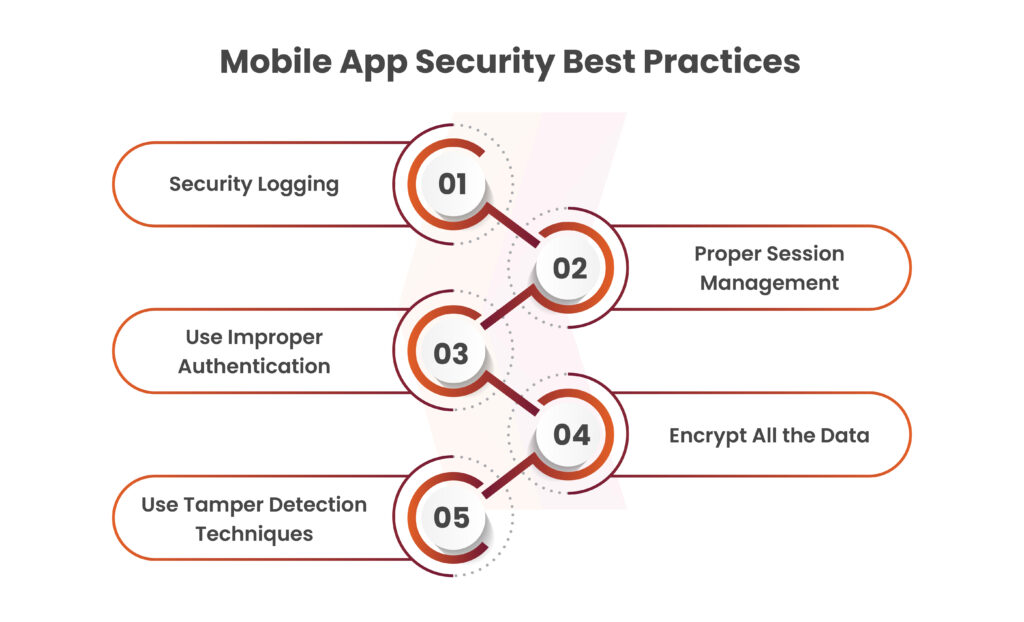Mobile application security testing is a critical aspect of modern software development, driven by the widespread use of mobile devices in our daily lives, which store vast amounts of personal data like photos, email access, social media accounts, and payment information. As a result, developers must implement robust measures to safeguard this sensitive information. A survey reveals that more than 98% of mobile apps lack security. This is primarily attributed to the common practice of postponing security testing for mobile apps until the end of the development cycle or neglecting it entirely.
Statistics on Mobile Application Market
- Statista Reports projects that mobile applications will generate $613 billion in revenue by 2025.

- The number of smartphone users, currently around 6.3 billion, is expected to reach 7.49 billion by 2025.
- Users spend 92.5% of their mobile time on apps and check their phones approximately 265 times a day.
- According to the market survey report, mobile phones account for 53.96% of web traffic.
Table of Contents
Mobile Application Security Testing?
Mobile application security testing involves assessing apps for quality, functionality, compatibility, usability, and performance. It targets Linux-based operating systems designed for touchscreen devices like tablets and smartphones. Mobile devices have evolved beyond wireless communication tools to encompass a broader ecosystem including servers, data centers, network infrastructure, and devices.
VAPT (Vulnerability Assessment and Penetration Testing) for mobile app security is a critical step in evaluating app security and mitigating risks such as fraud, malware, data leakage, and other vulnerabilities.
Best Practices of Mobile Application Security Testing in 2024

Ensure secure coding practices for mobile apps
Securing mobile apps is easier when you focus on key priorities and timing. Attackers often exploit code bugs or vulnerabilities to compromise applications. With access to a public copy of your app, they can reverse engineer and manipulate it. Market research suggests that over 11.6 million mobile devices are impacted by malicious code at any given time. Strengthen your code by employing hardening, obfuscation, and minification techniques to deter reverse engineering. Ensure your code is easily updatable and patchable. Conduct thorough testing and promptly address any discovered bugs.
Utilization of secured servers
Securing your servers is crucial for overall security. Implementing firewalls helps prevent unauthorized access and hijacking. Use HTTPS connections to ensure secure data transmission and deter network-based attacks. Keep server software updated and regularly patched, install antivirus software, limit access permissions, and use strong authentication methods. Encrypt stored data, regularly backup files, and avoid storing sensitive data on mobile devices. Use complex passwords and perform routine malware scans to maintain security. Following these practices significantly enhances mobile app security.
Use modern encryption methods
Data encryption in modern systems often utilizes public-key cryptography. Public-key cryptography uses two keys: a public key for encrypting messages and a private key for decrypting them. Messages encrypted with a recipient’s public key can only be decrypted with their private key, ensuring confidentiality and authentication. This encryption method protects messages from tampering and eavesdropping, making intercepted encrypted messages unreadable without the private key.
Implementing robust authentication
Given the significant security breaches attributed to weak authentication, enhancing authentication methods is increasingly vital. Authentication typically involves passwords and other identifiers serving as barriers to unauthorized access. To enforce stronger security measures, consider implementing requirements such as using strong alphanumeric passwords that are regularly updated every three or six months. For highly sensitive apps, biometric authentication methods like retina scans and fingerprints can be utilized. Multi-factor authentication is also growing in popularity, combining static passwords with dynamic one-time passwords (OTPs).
Unauthorized API access and inappropriate coded APIs can inadvertently expose critical information to hackers. When programmers locally cache authorization information, they inadvertently enable its reuse in subsequent API requests. While this practice simplifies API usage for developers, it also creates a security loophole that attackers can exploit to gain unauthorized privileges. Experts recommend centralizing API authorization for optimal security.
Importance of Mobile Application Security Testing
Mobile application security testing is essential for several key reasons. Firstly, it ensures timely detection and elimination of vulnerabilities before an application is released, safeguarding it against malicious attacks. By addressing these vulnerabilities, developers can release well-secured applications, preserving the safety of customer data. Additionally, maintaining compliance with security standards is crucial for mobile applications that handle payments and personal information. Finally, comprehensive security testing for mobile apps helps to mitigate security risks, protecting against data breaches, theft, and loss of confidential information. Overall, mobile app security testing is vital for ensuring the integrity and security of mobile applications.
Book Your Free Cybersecurity Consultation Today!
Why Mobile Application Security Matters?
- Mobile applications serve as a critical interface between businesses and users, storing important user information that requires a secure environment.
- Inadequate security can result in data breaches, exposing sensitive user data to potential threats.
- Rising regulatory demands necessitate improved data protection, with non-compliance potentially leading to significant penalties.
- Robust security measures help establish and uphold user trust.
- Inadequate security measures can hamper business’s reputation and diminish customer loyalty.
- Implementing effective security features can provide a competitive advantage in the mobile application market.
- Technological advancements like IoT applications demand robust security measures for safe operation.
Get in!
Join our weekly newsletter and stay updated
Conclusion
Mobile application security testing is crucial in our rapidly evolving digital world, where the majority of mobile apps currently lack sufficient security measures. To address this gap, developers must prioritize security testing for mobile apps throughout the development process rather than treating it as an afterthought. By implementing best practices like secure coding, server protection, encryption, robust authentication, and careful API usage, developers can protect their apps against various cyber threats. Beyond protecting data, mobile app security testing ensures compliance with regulations, fosters user trust, and upholds business reputations. In today’s competitive app market, investing in security is not just about risk management; it’s a strategic move that can enhance user experience, strengthen brand credibility, and drive sustained business growth.
As a CERT-In empanelled organization, Kratikal is equipped to enhance your understanding of potential risks. Our manual and automated Vulnerability Assessment and Penetration Testing (VAPT) services proficiently discover, detect, and assess vulnerabilities within your IT infrastructure. Additionally, Kratikal provides comprehensive security auditing services to ensure compliance with various regulations, including ISO/IEC 27001, GDPR, PCI DSS, and more, assisting your business in adhering to legal requirements set forth by diverse governments.
FAQ
- Q1: What is security testing in mobile applications?
Ans: Mobile application security testing validates security controls pre-production, detecting implementation errors and uncovering unforeseen edge cases that may lead to security bugs.
- Q2: How to test the security of an application?
Ans: Web application security testing protects sensitive data from hackers by discovering and addressing system vulnerabilities. Key steps include defining scope, analysis, designing test cases, execution, and analyzing outputs.








Leave a comment
Your email address will not be published. Required fields are marked *